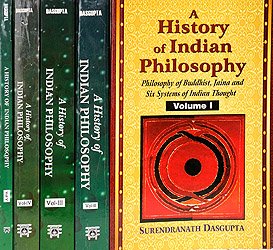A History of Indian Philosophy Volume 1
by Surendranath Dasgupta | 1922 | 212,082 words | ISBN-13: 9788120804081
This page describes the philosophy of the pessimistic attitude towards the world and the optimistic faith in the end: a concept having historical value dating from ancient India. This is the fifth part in the series called the “general observations on the systems of indian philosophy”, originally composed by Surendranath Dasgupta in the early 20th century.
Part 5 - The Pessimistic Attitude towards the World
[Full title: The Pessimistic Attitude towards the World and the Optimistic Faith in the end]
Though the belief that the world is full of sorrow has not been equally prominently emphasized in all systems, yet it may be considered as being shared by all of them. It finds its strongest utterance in Sāṃkhya, Yoga, and Buddhism. This interminable chain of pleasurable and painful experiences was looked upon as nearing no peaceful end but embroiling and entangling us in the meshes of karma, rebirth, and sorrow. What appear as pleasures are but a mere appearance for the attempt to keep them steady is painful, there is pain when we lose the pleasures or when we are anxious to have them. When the pleasures are so much associated with pains they are but pains themselves. We are but duped when we seek pleasures, for they are sure to lead us to pain. All our experiences are essentially sorrowful and ultimately sorrow-begetting. Sorrow is the ultimate truth of this process of the world. That which to an ordinary person seems pleasurable appears to a wise person or to a yogin who has a clearer vision as painful. The greater the knowledge the higher is the sensitiveness to sorrow and dissatisfaction with world experiences.
The yogin is like the pupil of the eye to which even the smallest grain of disturbance is unbearable. This sorrow of worldly experiences cannot be removed by bringing in remedies for each sorrow as it comes, for the moment it is remedied another sorrow comes in. It cannot also be avoided by mere inaction or suicide, for we are continually being forced to action by our nature, and suicide will but lead to another life of sorrow and rebirth. The only way to get rid of it is by the culmination of moral greatness and true knowledge which uproot sorrow once for all. It is our ignorance that the self is intimately connected with the experiences of life or its pleasures, that leads us to action and arouses passion in us for the enjoyment of pleasures and other emotions and activities. Through the highest moral elevation a man may attain absolute dispassion towards world-experiences and retire in body, mind, and speech from all worldly concerns.
When the mind is so purified, the self shines in its true light, and its true nature is rightly conceived. When this is once done the self can never again be associated with passion or ignorance. It becomes at this stage ultimately dissociated from citta which contains within it the root of all emotions, ideas, and actions. Thus emancipated the self for ever conquers all sorrow. It is important, however, to note in this connection that emancipation is not based on a general aversion to intercourse with the world or on such feelings as a disappointed person may have, but on the appreciation of the state of mukti as the supremely blessed one. The details of the pessimistic creed of each system have developed from the logical necessity peculiar to each system. There was never the slightest tendency to shirk the duties of this life, but to rise above them through right performance and right understanding.
It is only when a man rises to the highest pinnacle of moral glory that he is fit for aspiring to that realization of selfhood in comparison with which all worldly things or even the joys of Heaven would not only shrink into insignificance, but appear in their true character as sorrowful and loathsome. It is when his mind has thus turned from all ordinary joys that he can strive towards his ideal of salvation. In fact it seems to me that a sincere religious craving after some ideal blessedness and quiet of self-realization is indeed the fundamental fact from which not only her philosophy but many of the complex phenomena of the civilization of India can be logically deduced. The sorrow around us has no fear for us if we remember that we are naturally sorrowless and blessed in ourselves. The pessimistic view loses all terror as it closes in absolute optimistic confidence in one’s own self and the ultimate destiny and goal of emancipation.
